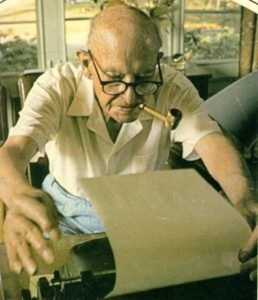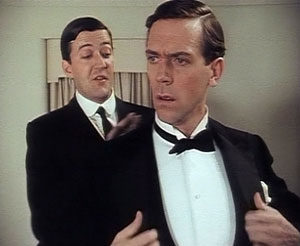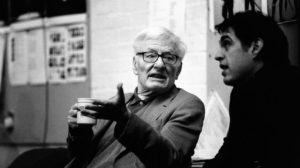 “This idea of the pursuit of happiness is at the heart of the attractiveness of the civilization to so many outside it or on its periphery. I find it marvelous to contemplate to what an extent, after two centuries, and after the terrible history of the earlier part of this century, the idea has come to a kind of fruition. It is an elastic idea; it fits all men. It implies a certain kind of society, a certain kind of awakened spirit. I don’t imagine my father’s Hindu parents would have been able to understand the idea. So much is contained in it: the idea of the individual, responsibility, choice, the life of the intellect, the idea of vocation and perfectibility and achievement. It is an immense human idea. It cannot be reduced to a fixed system. It cannot generate fanaticism. But it is known to exist, and because of that, other more rigid systems in the end blow away.”
“This idea of the pursuit of happiness is at the heart of the attractiveness of the civilization to so many outside it or on its periphery. I find it marvelous to contemplate to what an extent, after two centuries, and after the terrible history of the earlier part of this century, the idea has come to a kind of fruition. It is an elastic idea; it fits all men. It implies a certain kind of society, a certain kind of awakened spirit. I don’t imagine my father’s Hindu parents would have been able to understand the idea. So much is contained in it: the idea of the individual, responsibility, choice, the life of the intellect, the idea of vocation and perfectibility and achievement. It is an immense human idea. It cannot be reduced to a fixed system. It cannot generate fanaticism. But it is known to exist, and because of that, other more rigid systems in the end blow away.”
V.S. Naipaul, “Our Universal Civilization”

 Ivy Compton-Burnett admitted in old age that she could no longer read the novels of Jane Austen, which she loved, because she knew them so well that they could no longer hold her attention. Much the same thing happened to me with Sir Arthur Conan Doyle’s Sherlock Holmes stories: I read them so often as a boy that I
Ivy Compton-Burnett admitted in old age that she could no longer read the novels of Jane Austen, which she loved, because she knew them so well that they could no longer hold her attention. Much the same thing happened to me with Sir Arthur Conan Doyle’s Sherlock Holmes stories: I read them so often as a boy that I  Over the weekend it finally occurred to me to do what I should have done long ago, which was to ask Mrs. T, who is, like me, an ardent Wodehouse fan of long standing. No sooner did I ask her than her face lit up brightly with the realization that she knew something I didn’t. “I think you’ve got it wrong,” she said with uncontained glee. “It’s not great, it’s considerable.” And sure enough, it was: a quick search on Google told me that Bertie says “I shall watch your future progress with considerable interest” in Joy in the Morning and The Mating Season, in addition to which the same sentence is said to Bertie by another character in one of the stories collected in Very Good, Jeeves!
Over the weekend it finally occurred to me to do what I should have done long ago, which was to ask Mrs. T, who is, like me, an ardent Wodehouse fan of long standing. No sooner did I ask her than her face lit up brightly with the realization that she knew something I didn’t. “I think you’ve got it wrong,” she said with uncontained glee. “It’s not great, it’s considerable.” And sure enough, it was: a quick search on Google told me that Bertie says “I shall watch your future progress with considerable interest” in Joy in the Morning and The Mating Season, in addition to which the same sentence is said to Bertie by another character in one of the stories collected in Very Good, Jeeves! It’s easy enough in retrospect to see how Bertie, whom even the ever-faithful Jeeves unhesitatingly described as “mentally negligible,” might well have managed to conflate these two quotations. His mind—such as it was—worked that way. Had I continued searching on my own, though, I very much doubt that I would ever have managed to track them down to their primary sources. Such being the case, I humbly thank Mrs. T, David Hines, and David Mackinder for pointing me in all the right directions.
It’s easy enough in retrospect to see how Bertie, whom even the ever-faithful Jeeves unhesitatingly described as “mentally negligible,” might well have managed to conflate these two quotations. His mind—such as it was—worked that way. Had I continued searching on my own, though, I very much doubt that I would ever have managed to track them down to their primary sources. Such being the case, I humbly thank Mrs. T, David Hines, and David Mackinder for pointing me in all the right directions.
 First performed in 2015, “Hero’s Welcome” is a dark comedy of domestic strife, the story of three married couples who become ensnared in a tight tangle of mixed motives that leads inexorably to violence and despair. Unusually for Mr. Ayckbourn, Murray and Baba (Richard Stacey and Evelyn Hoskins), a returning war hero and his waif-like refugee bride, still have a fair chance at happiness, but the other two couples exemplify in sharply contrasting ways his long-standing conviction that marital life is a state in which, to paraphrase Dr. Johnson, much is to be endured—most of it by women—and little enjoyed….
First performed in 2015, “Hero’s Welcome” is a dark comedy of domestic strife, the story of three married couples who become ensnared in a tight tangle of mixed motives that leads inexorably to violence and despair. Unusually for Mr. Ayckbourn, Murray and Baba (Richard Stacey and Evelyn Hoskins), a returning war hero and his waif-like refugee bride, still have a fair chance at happiness, but the other two couples exemplify in sharply contrasting ways his long-standing conviction that marital life is a state in which, to paraphrase Dr. Johnson, much is to be endured—most of it by women—and little enjoyed…. Why has Mr. Shaffer faded from the scene? The main reason is undoubtedly that most of his best-known plays, which were written for England’s state-subsidized theaters, were large-scale works whose big casts (“Amadeus” and “Equus” both require 15 actors) put them out of reach of most American companies. At the same time, though, I get the impression that Mr. Shaffer is regarded by many drama critics as a middlebrow, a purveyor of high-minded, impeccably effective plays in which he watered down challenging subjects to make them palatable to the masses. A poor man’s Tom Stoppard, you might say.
Why has Mr. Shaffer faded from the scene? The main reason is undoubtedly that most of his best-known plays, which were written for England’s state-subsidized theaters, were large-scale works whose big casts (“Amadeus” and “Equus” both require 15 actors) put them out of reach of most American companies. At the same time, though, I get the impression that Mr. Shaffer is regarded by many drama critics as a middlebrow, a purveyor of high-minded, impeccably effective plays in which he watered down challenging subjects to make them palatable to the masses. A poor man’s Tom Stoppard, you might say.